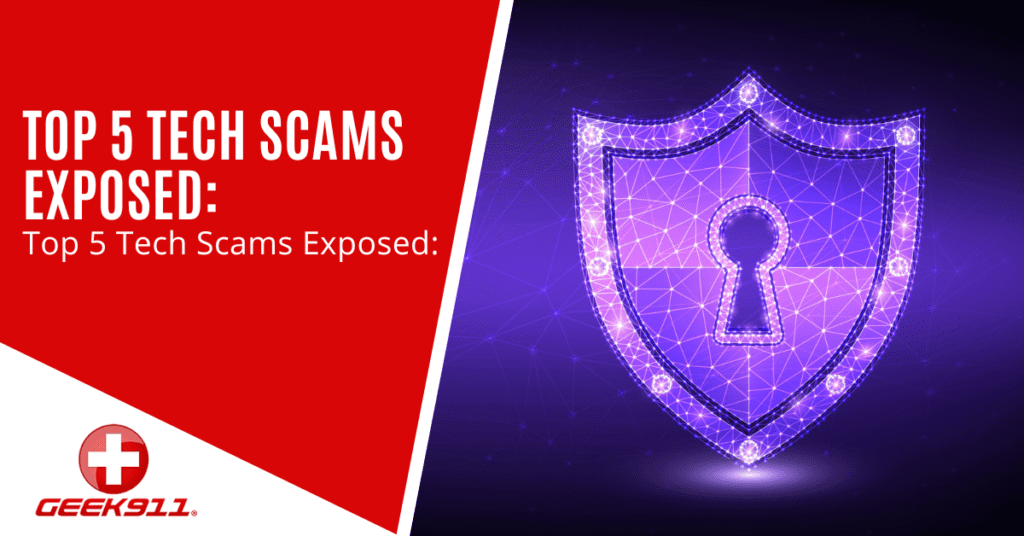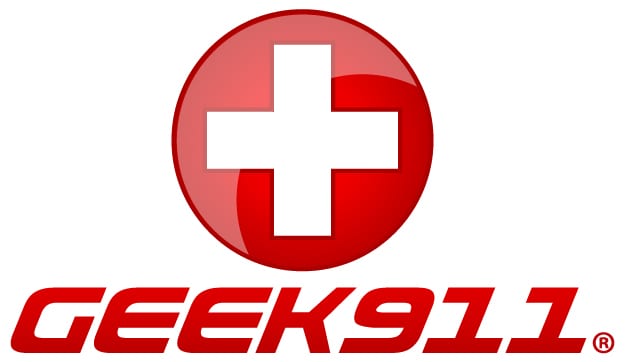Top 5 Tech Scams Exposed: Defending Small Businesses from Scams

The digital landscape offers a wealth of opportunities for small businesses, but it also harbors a dark side – tech scams. These scams exploit vulnerabilities in a business’s technical knowledge or security posture, resulting in financial losses, data breaches, and operational disruptions.
In this article, we’ll shed light on five of the most prevalent tech scams targeting small businesses, along with actionable steps to defend yourself and your organization.
1. Phishing Emails and Fake Invoices
Phishing emails try to trick recipients into revealing sensitive information like login credentials, credit card details, or downloading malware. Scammers often impersonate legitimate organizations, such as banks, tech companies, or even your own suppliers. AI has made phishing even more dangerous due to reducing red flags like poor grammar and spelling.
Red Flags:
- Generic Greetings: Emails addressing you generically (“Dear Customer”) instead of by name are a red flag.
- Urgency and Pressure: Phishing emails often create a sense of urgency or pressure to act immediately, urging you to click a link or download an attachment.
- Suspicious Links: Hover over links before clicking. If the displayed URL doesn’t match the text on the button or link, it’s likely a scam attempt.
Defense Strategies:
- Employee Training: Educate employees on identifying phishing attempts. Highlight common red flags and emphasize the importance of verifying sender legitimacy before clicking links or opening attachments.
- Email Filters: Utilize robust email filters to block suspicious emails before they reach employee inboxes.
- Multi-Factor Authentication (MFA): Implement MFA for all accounts to add an extra layer of security beyond just usernames and passwords.
2. Fake Tech Support Calls
These scams involve unsolicited calls claiming to be from a well-known tech company. The caller may warn you of a non-existent virus infection on your computer or network and pressure you into paying for unnecessary technical support services or remote access software that allows them to steal your data.
Red Flags:
- Unsolicited Contact: Legitimate tech support companies wouldn’t reach out via unsolicited calls.
- Scare Tactics: Scammers often use scare tactics like warnings of imminent data loss or system crashes to pressure you into action.
- Pressure to Pay Upfront: Legitimate companies typically don’t demand upfront payment for services.
- Remote Access Requests: Never grant remote access to your computer to unsolicited callers.
Defense Strategies:
- Do Not Engage: Never provide personal information or grant remote access to your computer to unsolicited callers.
- Verify Contact Information: If you suspect a problem, contact the legitimate tech support line of the company the caller claims to represent.
- Internal IT Support: Develop internal protocols for handling IT issues. Encourage employees to report suspected scams and refer technical issues to designated IT personnel.
3. “Free” Tech Trials and Software Downloads
Scammers may lure you in with “free” trials of software or services. However, once you provide your credit card information for the “trial,” you may be automatically enrolled in a recurring subscription with hidden fees. Additionally, free software downloads from untrusted sources can contain malware.
Red Flags:
- Promises That Seem Too Good to Be True: Be wary of software or services offered at suspiciously low prices or with overly generous features.
- Hidden Fees and Automatic Renewals: Read the fine print carefully before providing any payment information. Look for automatic renewal clauses and hidden fees.
- Unfamiliar Download Sources: Only download software from trusted sources like the official websites of reputable companies.
Defense Strategies:
- Research Before Downloading: Research any software or service before downloading. Read reviews from trusted sources and check for user complaints.
- Use Strong Passwords: Use strong and unique passwords for all online accounts to protect yourself from unauthorized access.
- Monitor Credit Card Statements: Regularly monitor your credit card statements for unauthorized charges and report any suspicious activity immediately.
4. Ransomware Attacks
Ransomware is a type of malware that encrypts your computer files, rendering them inaccessible. The attackers then demand a ransom payment to decrypt your files. Small businesses can be particularly vulnerable to ransomware attacks as they may not have robust cybersecurity measures in place.
Red Flags:
- Digital Ransom Note: The way the attacker requests payment is to place a digital ransom note on an infected system that comes up on the screen.
- Missing Files or Folders: As ransomware makes its way through a computer and network, users lose access to files, folders, and the systems that rely on that data to operate.
- Uses Phishing Tactics: Ransomware scammers usually deliver their malware using phishing.
Defense Strategies:
- Backups: Implement a regular data backup schedule and store backups securely, preferably offline.
- Software Updates: Ensure all software applications and operating systems are updated with the latest security patches to address vulnerabilities exploited by ransomware.
- Anti-Malware Software: Utilize a reputable anti-malware solution that can detect and block ransomware attempts.
5. Tech Support Service Contract Scams
Scammers may reach out offering to audit your current tech support contracts or promising significant savings on new contracts. However, these “contracts” often lock you into overpriced and unnecessary services or fail to deliver on promised benefits.
Red Flags:
- Vague or Generic Services: Be wary of contracts that offer vague or generic services without a clear understanding of your specific needs.
- High-Pressure Sales Tactics: Scammers often use high-pressure tactics to close deals quickly, leaving you little time to review the contract details.
Defense Strategies:
- Deal Only with Reputable Vendors: Work with established and reputable technology vendors with a proven track record.
- Seek Recommendations: Get referrals from trusted colleagues or industry professionals for reliable tech support providers.
- Review Contracts Thoroughly: Always carefully review any service contracts before signing. Understand the costs, services offered, and termination clauses.
Need Help Scam-Proofing Your Business?
Technology scams are a constant threat, but the right IT support can be your best defense. GEEK911 can help your Silicon Valley business with customized managed IT support that improves your cybersecurity and resilience.
Contact us today to schedule a consultation. Call 866-433-5411 or reach us online.
